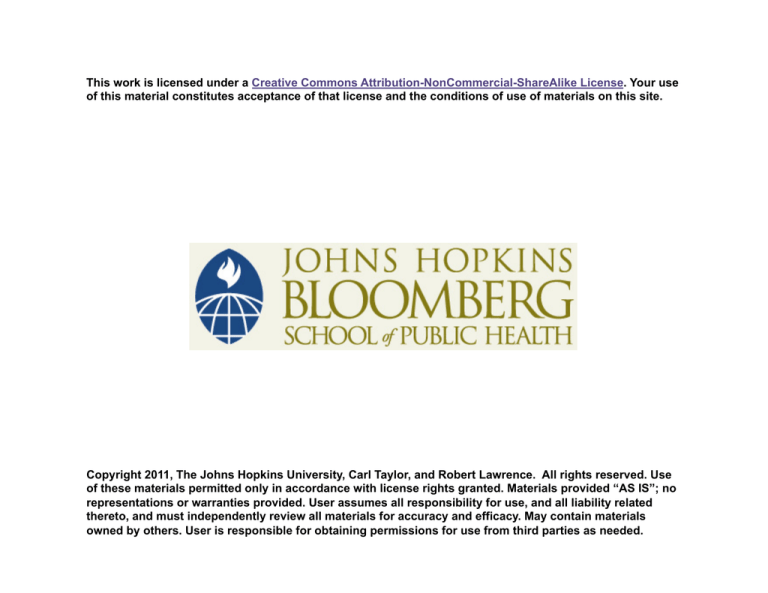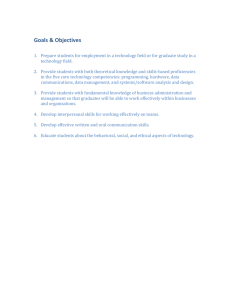
This work is licensed under a Creative Commons Attribution-NonCommercial-ShareAlike License. Your use
of this material constitutes acceptance of that license and the conditions of use of materials on this site.
Copyright 2011, The Johns Hopkins University, Carl Taylor, and Robert Lawrence. All rights reserved. Use
of these materials permitted only in accordance with license rights granted. Materials provided “AS IS”; no
representations or warranties provided. User assumes all responsibility for use, and all liability related
thereto, and must independently review all materials for accuracy and efficacy. May contain materials
owned by others. User is responsible for obtaining permissions for use from third parties as needed.
Case Studies in Primary Health Care:
Lessons Learned
Carl E. Taylor MD, MPH, DrPH
Robert S. Lawrence, MD
Johns Hopkins University
Sharing of Ideas: Carl Taylor and Bob Lawrence
Looking back can reveal what is really important for today
Carl is very concerned about the growing disparities in health
Equity is emerging as the key ethical issue in primary health care
3
Importance of Equity Continues to Be an Issue Globally
Virchow in the early 1800s said that the fundamental mission of
health care is to afford everyone an equal opportunity to fulfill the
natural lifespan
Internationally, the U.S. health system is viewed as being the best
in terms of its technical achievements
- However, it is a very distorted system when disparities are
considered
4
Failings of U.S. Health Care—and What Can Be Done
Disparities can be addressed at many different levels
- Including uninsured and underinsured
Failure of the system to utilize the resources of the community to
address the fundamental social determinants of health—problems
for which there is not a simple technical fix
Pierre Trudeau, as Prime Minister of Canada, initiated the LaLonde
Commission to examine health disparities; it found that:
- Health care access accounted for 20%
- Unanswered questions in biology were 20%
- Environmental issues were 20%
- Lifestyle and behavioral factors accounted for 40%
Community resources can be mobilized to:
- Help people understand and implement dietary and behavioral
changes
- Obtain social support
- Provide access
5
Halfdan Mahler (WHO) and Jim Grant (UNICEF)
In preparation for the Alma Ata conference, there was a total
mismatch between what the experts were thinking and what was
really going on in countries
There was very little evidence to support planning decisions
Argument between developed and developing countries about:
- “HEALTH for all”
- “Health FOR ALL”
Are we ready to be more realistic in reviewing current evidence?
6
Polarization between Comprehensive, Selective PHC
Continued debate similar to the “Straw Man of Primary Care”
It is time to bring these perspectives together
- Some vertical programs are necessary
- Behavioral and chronic disease require different approaches
7
Polarization between Comprehensive, Selective PHC
Continued debate similar to the “Straw Man of Primary Care”
It is time to bring these perspectives together
- Some vertical programs are necessary
- Behavioral and chronic disease require different approaches
Three domains for future research
8
Polarization between Comprehensive, Selective PHC
Continued debate similar to the “Straw Man of Primary Care”
It is time to bring these perspectives together
- Some vertical programs are necessary
- Behavioral and chronic disease require different approaches
Three domains for future research
- Technological (Jim Grant’s “low hanging fruit”)
9
Polarization between Comprehensive, Selective PHC
Continued debate similar to the “Straw Man of Primary Care”
It is time to bring these perspectives together
- Some vertical programs are necessary
- Behavioral and chronic disease require different approaches
Three domains for future research
- Technological (Jim Grant’s “low hanging fruit”)
- Behavioral and lifestyle
10
Polarization between Comprehensive, Selective PHC
Continued debate similar to the “Straw Man of Primary Care”
It is time to bring these perspectives together
- Some vertical programs are necessary
- Behavioral and chronic disease require different approaches
Three domains for future research
- Technological (Jim Grant’s “low hanging fruit”)
- Behavioral and lifestyle
- Empowerment of women and social determinants of health
Mothers are the most important health care workers in the world
11
Appropriate Technologies for Health
Profit motive drives the technical fixes over the others
Since World War II, there has been more emphasis on “the right for
participation” at the household, workplace, or national level
However, no similar studies have been done with low-income groups
From a human rights framework, the emphasis on universal access
addresses this right for participation
12
Achieving System Change to Make a Real Difference
Change must occur from the top but be based on people’s demands
Starting to build ethical principles around community-based
participatory research, which enhances their capacity to develop
13
Achieving System Change to Make a Real Difference
Change must occur from the top but be based on people’s demands
Starting to build ethical principles around community-based
participatory research, which enhances their capacity to develop
More of a consensus is emerging that there is an ethical obligation:
- For the top-down funding from the outside in
- Government has a role to protect the people from interference
- Government has a duty to fulfill the needs of its people
14
Achieving System Change to Make a Real Difference
Change must occur from the top but be based on people’s demands
Starting to build ethical principles around community-based
participatory research, which enhances their capacity to develop
More of a consensus is emerging that there is an ethical obligation:
- For the top-down funding from the outside in
- Government has a role to protect the people from interference
- Government has a duty to fulfill the needs of its people
This approach to food safety is now being extended to health
15
Achieving System Change to Make a Real Difference
Change must occur from the top but be based on people’s demands
Starting to build ethical principles around community-based
participatory research, which enhances their capacity to develop
More of a consensus is emerging that there is an ethical obligation:
- For the top-down funding from the outside in
- Government has a role to protect the people from interference
- Government has a duty to fulfill the needs of its people
This approach to food safety is now being extended to health
Martin Luther King said “The moral arc of history is long, but it
bends towards justice”
16
“Health for All by the Year 2000
“Health for all by the Year 2000” can now be viewed as one of the
first millennium development goals
17






